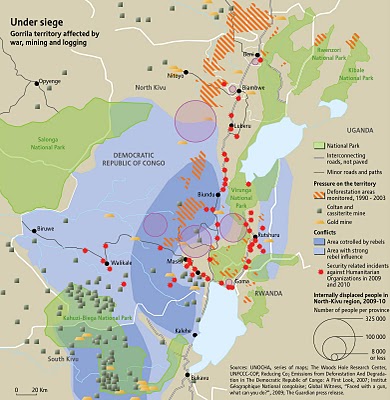Gorillas could disappear from the Congo basin in the next 10-15 years, according to a new report issued by the United Nations and Interpol.
The Last Stand of the Gorilla – Environmental Crime and Conflict in the Congo Basin places responsibility for the decline of
gorilla populations in the Democratic Republic of the Congo and its surrounding region squarely on the shoulders of
resource-hungry militants, who poach gorilla bushmeat to feed hungry soldiers and mine workers and sell in local markets. Militants extract timber, charcoal, diamonds, and other resources to raise funds for arms, reducing gorilla territory.
Yet another rationale is retaliation against park rangers who attempt to limit their illegal activities within national parks. In the process, park rangers have found themselves, their parks, and their endangered charges targets of militant groups seeking to plunder and traffic goods through protected areas. “In Virunga Park alone, 190 park rangers have been killed in the last 15 years,” notes the report, which is also available in an interactive e-book edition.
Conflict with local communities also frequently leads to the slaughter of the gorillas and loss of their habitats. Displaced people and refugees also compete with gorillas for land. In several cases, gorillas facing shrinking natural domains have satisfied their appetites in banana plantations, and local farmers have struck back.
Strengthening Law Enforcement
Not all, however, is dire. The report finds several success stories stemming out of transboundary law enforcement collaboration and recommends increased training and support for local and international law enforcement groups. “The gorillas are yet another victim of the contempt shown by organized criminal gangs for national and international laws aimed at defending wildlife,” said David Higgins, Interpol’s Environmental Crime Programme Manager. “The law enforcement response must be internationally coordinated, strong, and united, and Interpol is uniquely placed to facilitate this.”
Law enforcement in the Congo Basin faces an uphill battle, in part due to conditions present in peace agreements between guerillas and the Congolese government. Removing vehicle checkpoints from important border crossings was key to the insurgents agreeing to peace. While these agreements reduced violence, they have created a highway for illegal exports. This trade props up the militant groups and undercuts the chances for peace on a regional scale. It is an example of how large remaining quantities of automatic weapons and turns to poaching by ex-militants can render post-conflict environments even more damaging to local wildlife than war itself.
Toward Coexistence
In some locations, conflicts between gorillas and local farmers are disappearing with the construction of natural barriers and as local populations realize the potential of ecotourism to generate greater revenue from thriving gorilla populations than collapsing ones. Greater international coordination and local commitment, however, are necessary. Turning threatening competition into beneficial cooperation is possible.
Tara Innes is a PhD student at the University of Maryland, studying conflict-environment linkages.
Photos: Gorilla, courtesy Flickr user mrflip; Gorilla Territory Affected by War, Mining, and Logging courtesy UNEP/GRID-Arendal.
 A Publication of the Stimson Center.
A Publication of the Stimson Center.





